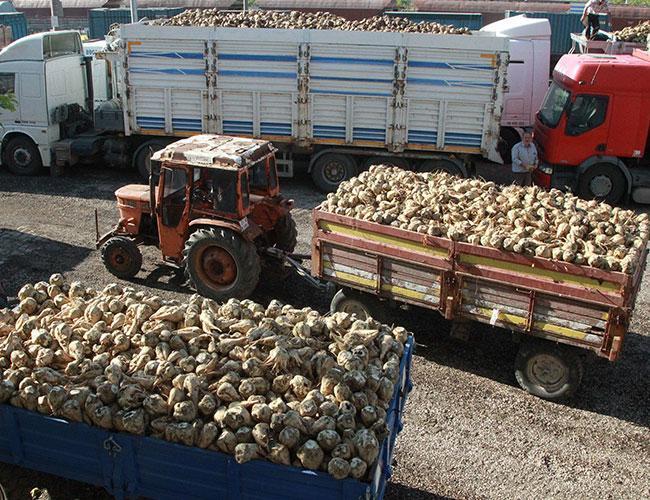Turkish Agriculture Ministry may bid for some privatized sugar plants: Minister
ANKARA

The Agriculture and Livestock Ministry may bid to buy some of the sugar plants currently slated for privatization, Agriculture and Livestock Minister Ahmet Eşref Fakıbaba said on March 12.
“If we think conditions are appropriate, we will consider buying some those factories through the Agriculture Credit Cooperatives [Tarım Kredi Kooperatifleri],” Fakıbaba stated, without elaborating.
Amid sharp criticism from different quarters, including the main opposition Republican People’s Party (CHP) and labor unions, Fakıbaba said the privatization of the sugar plants would increase pulp production that in return will boost employment in the sector.
“Production will increase and as a result sugar prices will decline. Farmers and the countryside will benefit from this,” he added.
The lower prices stemming from the privatizations will also provide a better opportunity to compete with starch-based sugar, Fakıbaba said.
Private cooperatives own eight sugar plants while the state operates 25, he added, noting that privately owned factories produce 1 million tons of sugar while the corresponding figure for state-owned plants is 1.4 million tons.
“We, as the state, need to compete with the private sector. We need to have competition. Should all sugar plants be privatized? No. The state must regulate strategic products,” Fakıbaba said.
Controversial privatization
The government’s decision to privatize a total of 14 state-run sugar factories has caused much controversy.
CHP head Kemal Kılıçdaroğlu recently claimed that the privatization move aims to promote starch-based sugar production and “affects nearly a million Turkish citizens.”
Addressing the CHP parliamentary group on Feb. 27, Kılıçdaroğlu said the government’s move is related to U.S. food corporation Cargill’s investments in Turkey.
“They are doing this to clear the way for the starch-based sugar production. They gave promises to the former president of the United States for Cargill to establish here in Turkey,” Kılıçdaroğlu said.
Cargill produces liquid sugar from Genetically Modified Corns and the use of such sugar is forbidden in some countries, though consumption in Turkey is rising, according to the CHP leader.
The Union of Turkish Chambers of Agriculture (TZOB) has also voiced concern, arguing that privatization would badly hit sugar beet producers.
“The factories to be privatized buy sugar beet from farmers in 1,575 villages and towns across Turkey,” TZOB) head Şemsi Bayraktar said on March 1.
Some 47,758 farmers sell sugar beet to these factories while their total production area exceeds 1.25 million decares, Bayraktar added.
According to a notice released in the Official Gazette on Feb. 21, bids will be collected for sugar plants in the Central Anatolian provinces and towns of Bor, Çorum, Kırşehir and Yozgat until April 3, and in the eastern and Black Sea provinces and towns of Erzincan, Erzurum, Ilgın, Kastamonu and Turhal until April 11.
The authority has set April 18 as the date to collect bids for sugar plants in other areas: Afyon, Alpullu, Burdur, Elbistan and Muş.
Starch-based sugar production
Since the announcement of the decision to privatize the factories, one of the hotly debated issues has been whether the quotas for starch-based sugar (SBS) would be increased.
On March 12, the Health Ministry’s Scientific Committee issued a notification recommending that the government and industry “take all kinds of measures” to restrict the consumption and production of SBSs, which it warns cause serious health problems such as obesity and diabetes.
“[The committee recommends that] measures are taken to restrict the consumption of all kinds of sugar, revising subsidies and tariffs and initiating activities to inform and raise awareness,” the notification read.
“[The committee recommends the government] not to raise the raise the production quota of the SBS’s, which is still 10 percent, and to restrict its usage in food through strict supervision,” it added.
The committee also stated that the over-consumption of sugar “precipitates some cancer types such as colon, pancreas, liver and breast cancers,” as well as trigger “liver fattening, cirrhosis, changes in gut flora and microbiota.”
The commission recommended the percentage of fructose in food should be stated on packages.
SBSs, also known as High Fructose Corn Syrup, is an industrial sweetener produced from corn, potato and wheat. It has the second largest share in beverage and food production after table sugar produced from sugar beet.
















